1970-July 1974
Τhe History of this period in the following genial.ly presentation
Info from students' web search on which the presentation is based:
The Greek junta or Regime of the Colonels was a far-right authoritarian military junta that ruled Greece from 1967 to 1974. On 21 April 1967, a group of colonels overthrew the caretaker government a month before scheduled elections which Georgios Papandreou's Centre Union was favored to win. The dictatorship was characterized by right-wing cultural policies, restrictions on civil liberties, and the imprisonment, torture, and exile of political opponents. An attempt to renew its support in a 1973 referendum on the monarchy and gradual democratization was ended by another coup by the hardliner Dimitrios Ioannidis. The junta's rule ended on 24 July 1974 under the pressure of the Turkish invasion of Cyprus, leading to the Metapolitefsi ("regime change") to democracy and the establishment of the Third Hellenic Republic.
https://en.wikipedia.org/wiki/Greek_junta
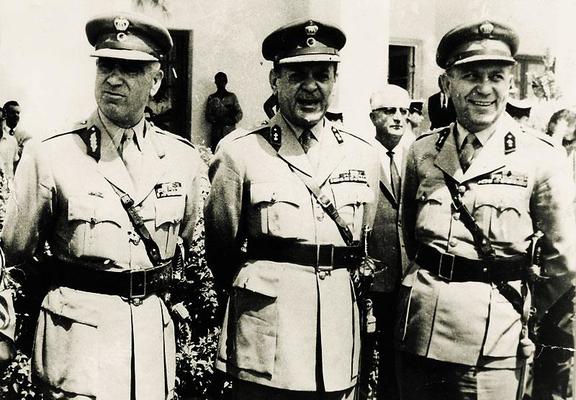
Papadopoulos (center) with fellow coup leaders Pattakos (left) and Makarezos (right) (source: Unknown author - https://athens.indymedia.org/post/1543277/ )
POLITICS
1970, 1971, 1972
• Monarch: Constantine II
• Regent: Georgios Zoitakis
• Prime Minister: Georgios Papadopoulos
1973
• Monarch: Constantine II (until 1 June)
• President: Georgios Papadopoulos (1 June to 25 November), Phaedon Gizikis (starting 25 November)
• Regent: Georgios Papadopoulos (until 31 May)
• Prime Minister: Georgios Papadopoulos (until 8 October), Spyros Markezinis (8 October to 25 November), Adamantios Androutsopoulos (starting 25 November)
1974
President: Phaedon Gizikis (until December 18),[1] Michail Stasinopoulos (starting December 18)
Prime Minister: Adamantios Androutsopoulos[3] (until 24 July), Konstantinos Karamanlis (starting 24 July) =>Third Hellenic Republic (The Third Hellenic Republic (Greek: Γ΄ Ελληνική Δημοκρατία) is the period in modern Greek history that stretches from 1974, with the fall of the Greek military junta and the final abolition of the Greek monarchy, to the present day)
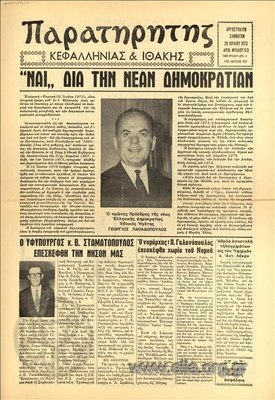
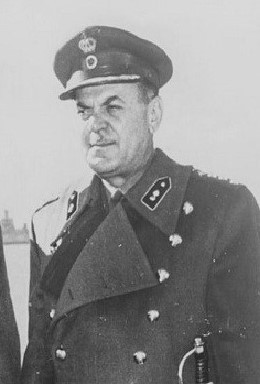
http://archives.elia.org.gr:8080/LSelia/images_View/%CE%95%CE%A6.%CE%A4%CE%9F.%CE%9B.%CE%9A32.10.JPG
Unknown author - https://athens.indymedia.org/post/1586866/
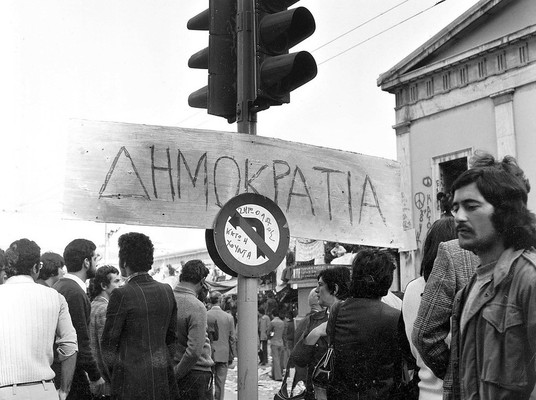
https://www.flickr.com/photos/piazzadelpopolo/3048126889
The Athens Polytechnic uprising occurred in November 1973 as a massive student demonstration of popular rejection of the Greek military junta of 1967–1974. It began on 14 November 1973, escalated to an open anti-junta revolt, and ended in bloodshed in the early morning of 17 November after a series of events starting with a tank crashing through the gates of the Athens Polytechnic.
(source: https://en.wikipedia.org/wiki/Athens_Polytechnic_uprising)
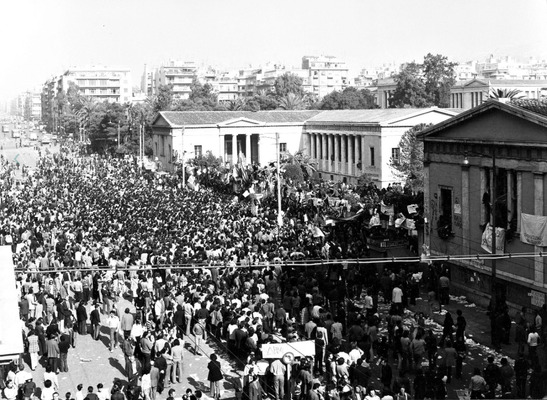
https://commons.wikimedia.org/wiki/File:Athens_Polytechnic_1973.png
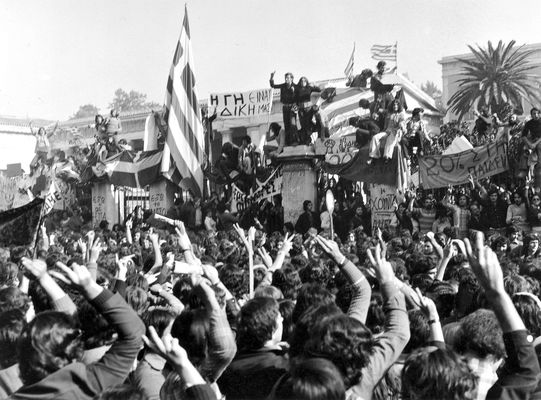
https://www.ertnews.gr/perifereiakoi-stathmoi/pirgos/pyrgos-me-metra-prostasias-apo-ti-diaspora-toy-koronoioy-timatai-i-exegersi-toy-polytechneioy/
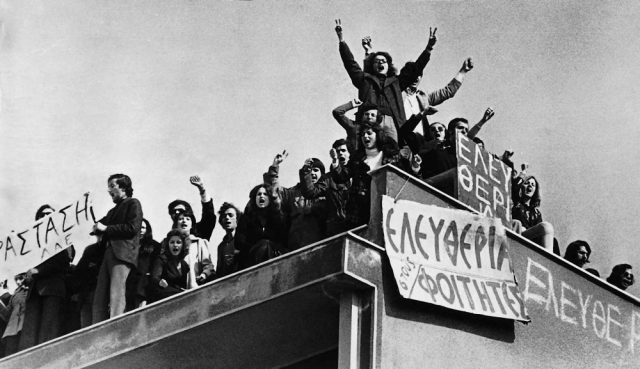
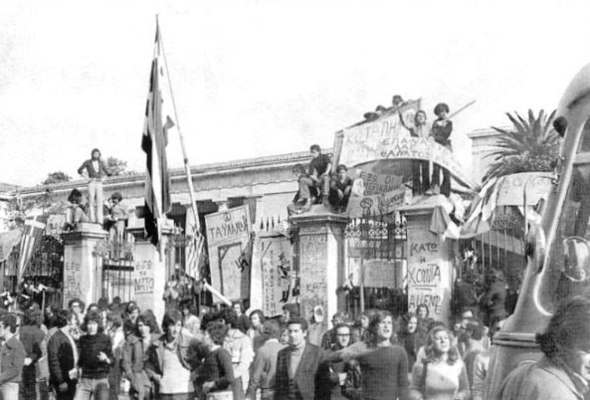
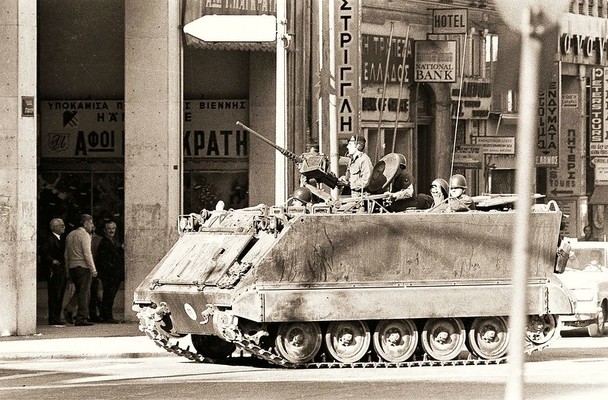
https://www.flickr.com/photos/piazzadelpopolo/3048974730
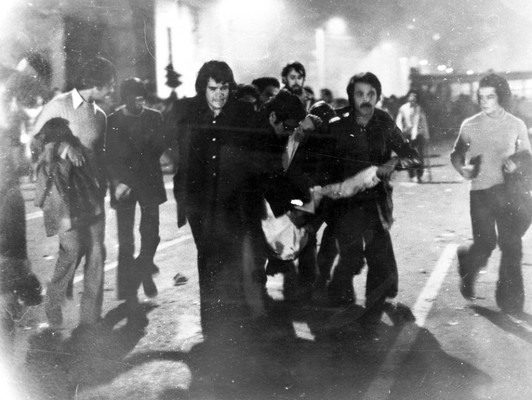
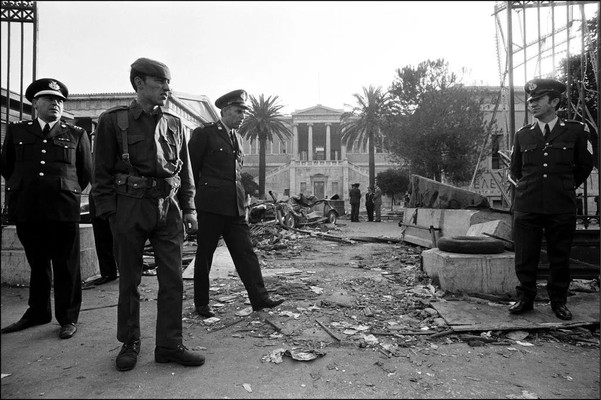
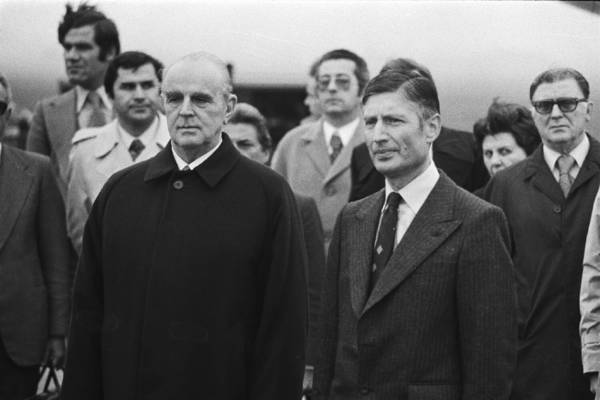
Konstantinos Karamanlis, image copyright free (https://www.nationaalarchief.nl/onderzoeken/fotocollectie/acafdae8-d0b4-102d-bcf8-003048976d84)
Everyday life
Picnic
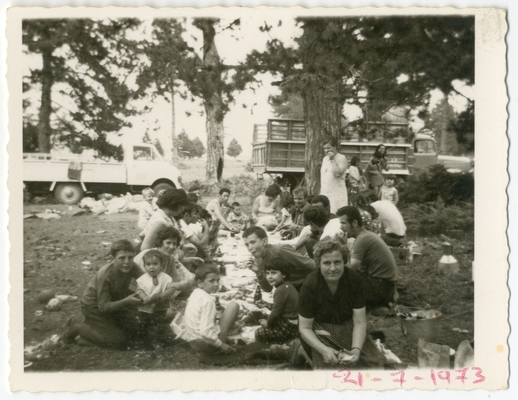
Today families do not have that many kids! It is impressive that they are all together happy and no selfies
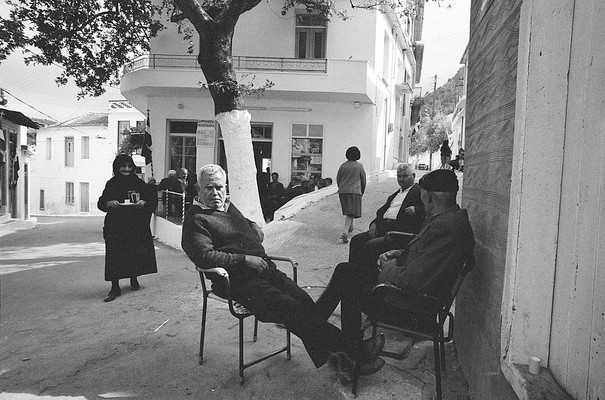
At a cafe (Kafeneio in Greek)
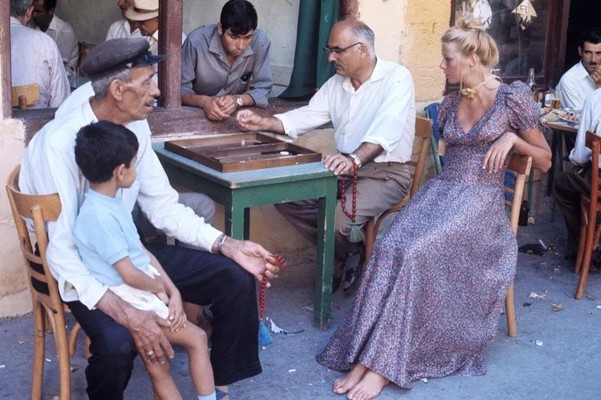
A cafe in a more glamorous option (probably a concept for a fashion magazine)
SCHOOL LIFE
Schools were Monday to Saturday
Students had to wear uniforms
Punishments were very strict (beating a student that has broken a rule it was normal)
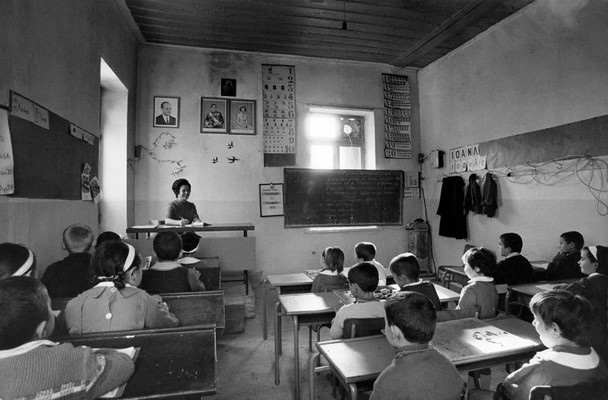
Poetry
Seferis
In 1967 the repressive nationalist, right-wing Regime of the Colonels took power in Greece after a coup d'état. After two years marked by widespread censorship, political detentions, and torture, Seferis took a stand against the regime. On March 28, 1969, Seferis made a statement on the BBC World Service,with copies simultaneously distributed to every newspaper in Athens. In authoritative and absolute terms, he stated "This anomaly must end".
(Giorgos or George Seferis was a Greek poet and diplomat. He was one of the most important Greek poets of the 20th century, and a Nobel laureate (1963). He was a career diplomat in the Greek Foreign Service, culminating in his appointment as Ambassador to the UK, a post which he held from 1957 to 1962.)
Yiannis Ritsos was a Greek poet and communist. While he disliked being regarded as a political poet, he has been called "the great poet of the Greek left". In 1967 he was arrested by the Papadopoulos dictatorship and sent to a prison camp. Today, Ritsos is considered one of the great Greek poets of the twentieth century. Pablo Neruda declared him to be more deserving of the Nobel Prize for Literature than himself. Ritsos was unsuccessfully proposed nine times for it. When he won the Lenin Peace Prize in 1975, he declared "this prize is more important for me than the Nobel."
Of his notable works Epitaphios (1936; second edition, 1956), Romiosini (1954) and 18 short songs of the bitter Motherland (18 λιανοτράγουδα της πικρής πατρίδας/18 Lianotragouda Tis Pikris Patridas) (1973) have been connected with the Junta era. Epitaphios became an anthem of the Greek left since 1950s, and his best-known work.
Ritsos won the first Greek state poetry award for Moonlight Sonata:
I know that each one of us travels to love alone,
alone to faith and to death.
I know it. I’ve tried it. It doesn’t help.
Let me come with you.
—from Moonlight Sonata. Translation by Peter Green and Beverly Bardsley
Elytis had devoted himself exclusively to today's Hellenism, of which he attempted—in a certain way based on psychical and sentimental aspects—to reconstruct modernist mythology for the institutions. His main endeavor was to rid people's conscience from unjustifiable remorses and to complement natural elements through ethical powers, to achieve the highest possible transparency in expression, and finally, to succeed in approaching the mystery of light, the metaphysics of the sun of which he was a "worshiper" -idolater by his own definition. A parallel manner concerning technique resulted in introducing the inner architecture, which is evident in a great many poems of his; mainly in the phenomenal landmark work, It Is Truly Meet (Το Άξιον Εστί). This work due to its setting to music by Mikis Theodorakis as an oratorio is a revered anthem whose verse is sung by all Greeks for all injustice, resistance, and for its sheer beauty and musicality of form.
(Odysseas Elytis was a Greek poet, essayist, and translator, regarded as a major exponent of romantic modernism in Greece and the world. He is one of the most praised poets of the second half of the twentieth century, with his Axion Esti "regarded as a monument of contemporary poetry". In 1979, he was awarded the Nobel Prize in Literature. Work in poetry during this decade:
- The Light Tree And The Fourteenth Beauty (Το φωτόδεντρο και η δέκατη τέταρτη ομορφιά, 1972)
- The Sovereign Sun (Ο ήλιος ο ηλιάτορας, 1971)
- The Trills of Love (Τα Ρω του Έρωτα, 1973)
- The Monogram (Το Μονόγραμμα, 1972)
- Step-Poems (Τα Ετεροθαλή, 1974) )
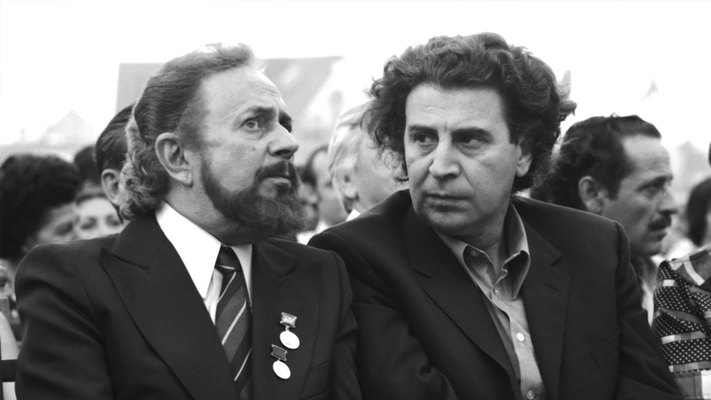
Mikis Theodorakis and Yiannis Ritsos
(Lefteris, Fotis, Stefanos, C1a
source: wikipedia)
Music
This is the period of Éntekhno (lit. meaning 'art song") is orchestral music with elements from Greek folk rhythm and melody; its lyrical themes are often based on the work of famous Greek poets. As opposed to other forms of Greek urban folk music, éntekhno concerts would often take place outside a hall or a night club in the open air. Mikis Theodorakis and Manos Hadjidakis were the most popular early composers of éntekhno song cycles. They were both educated in Classical music and -among other reasons- the lacking of a wide public for this kind of music in Greece, drove them to the invention of Éntekhno, in which they transferred some values of Western art music,[12] such as ballads tune.
Theodorakis was the first composer to use the bouzouki in this genre of music, trying to include this organ into the mainstream culture. Other significant Greek songwriters included Stavros Kouyoumtzis, Manos Loïzos, and Dimos Moutsis. Significant lyricists of this genre are Nikos Gatsos, Manos Eleftheriou and poet Tasos Livaditis. By the 1960s, innovative albums helped éntekhno become close to mainstream, and also led to its appropriation by the film industry for use in soundtracks.
A specific form of éntekhno was the so-called "political song"; songs with political message, of the Left, which arose during the military junta and became very popular after its fall in the late '70s. Manos Loizos, guitarist Panos Tzavellas, Maria Dimitriadi and Maria Farantouri were some representatives. Thanos Mikroutsikos released an album featuring Greek partisan songs of the Greek resistance, with his own orchestration. A form of éntekhno which is even closer to western classical music was introduced during the late 1970s by Mikroutsikos. (See the section 'Other popular trends' below for further information on Néo Kýma and contemporary éntekhno.)
Important works on these years (1970-1975)
- Ballos (Dionysis Savvopoulos, 1970)
- O Megalos Erotikos (Manos Hatzidakis, 1972)
- Eighteen Short Songs of the Bitter Motherland (Mikis Theodorakis, 1973, poetry by Yiannis Ritsos)
- Our Great Circus (Stavros Xarchakos for the theatrical play of Iakovos Kambanellis, 1974)
- Tetralogia (Dimos Moutsis, 1975, poetry by Constantine P. Cavafy, Kostas Karyotakis, Yiannis Ritsos and Giorgos Seferis)
(source wikipedia)
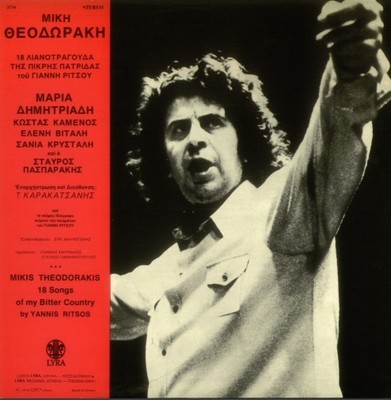
Theater "Our Great Circus"
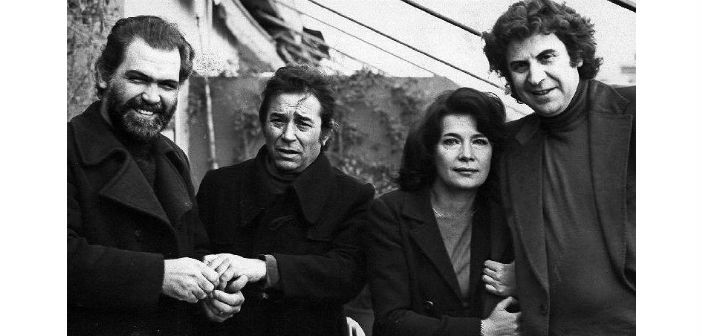
(in the photo from the left: Kazakos, Kampanellis, Karezi, Theodorakis)
Athenaion theater
22 June 1973- suspended mid-October to mid-November 1973
Συγγραφέας: Ιάκωβος Καμπανέλλης (Author Iakovos Kampanellis)
Σκηνοθεσία: Κώστας Καζάκος (Director: Kostas Kazakos)
Scenery: Eugenios Spatharis
Music: Stavros Xarchakos
Actors: Costas Kazakos, Christos Kalavrouzos, Jenny Karezi, Nikos Kouros, Spyros Konstantopoulos, Nikos Xylouris, Dionysis Papagiannopoulos, Timos Perlegkas
An allegorical theatrical performance that tells the history and sufferings of the Greek state from the arrival of Otto as 1st King of Greece in 1833 until the Polytechnic uprising against the junta. Through satirical and dramatic scenes and songs, there was a flashback to the history of Greece and the aim was to deceive the censorship of the junta and send messages of awakening to the Greek people.
Some facts:
The show was a huge box office success (approximately 400,000 tickets) but at the same time a major cause of revolution.
Slogans such as "BREAD-EDUCATION-FREEDOM" and "VOICE OF THE PEOPLE - RAGE OF GOD", known from the uprising of the Polytechnic School, had first appeared in the show.
Karezi -the main actress- spent a month in prison and the performances were interrupted from mid-October to mid-November 1973 and resumed after the events at the Polytechnic School. Also the other members of the group were under surveillance.
"Our big circus" had a great impact on the public, and was as the "largest - up to the Polytechnic - political protest rallies."
CINEMA
1970-1974-Greek-Cinema.pdf
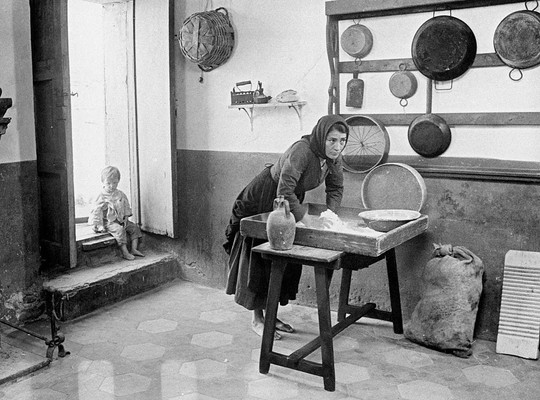
Irene Papa "Christ stopped at Eboli"
Christ Stopped at Eboli is a 1979 drama film directed by Francesco Rosi, adapted from the book of the same name by Carlo Levi. It stars Gian Maria Volonté as Levi, a political dissident under Fascism who was exiled in the Basilicata region in Southern Italy and it is very important participation of the Greek actor Irene Pappa. It was included in the book 1001 Movies You Must See Before You Die
ART
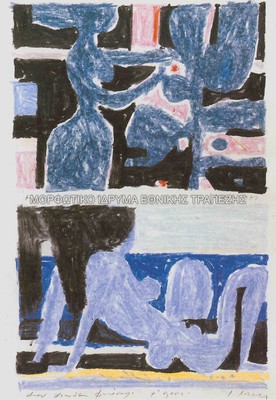
Moralis, Greek Aggregator SearchCulture.gr | National Documentation Centre (EKT), 1973, source
MOVIE STARS visit Athens
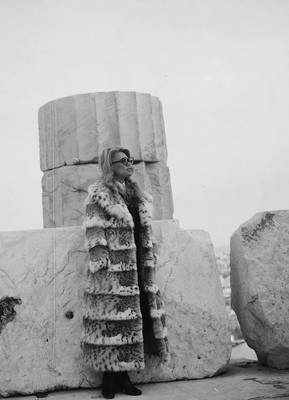
Actress Dyan Cannon visits the Acropolis, in Greece to star in the film ‘The Burglers’ Athens March 23rd 1971
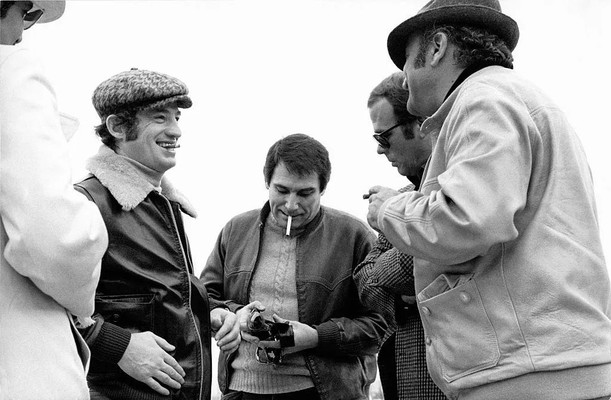
Jean-Paul Belmondo and Robert Hossein on the set of the film ‘Le casse’ directed by Henri Verneuil in 1971 in Athens
Beauty contests in Greece!!!
Participants in Miss Universe Competition at Herodium Odeon theater, Athens
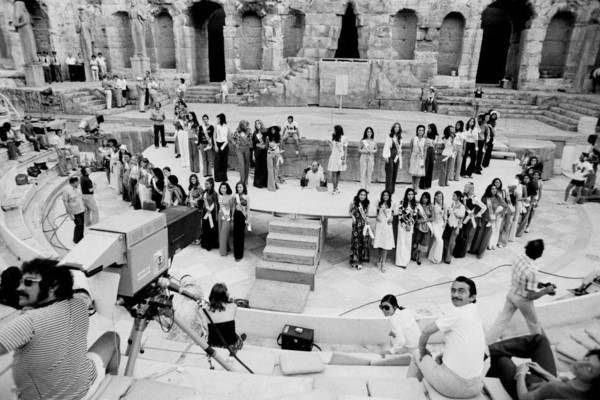
Candidates to Miss Europe beauty contest at Hydra island
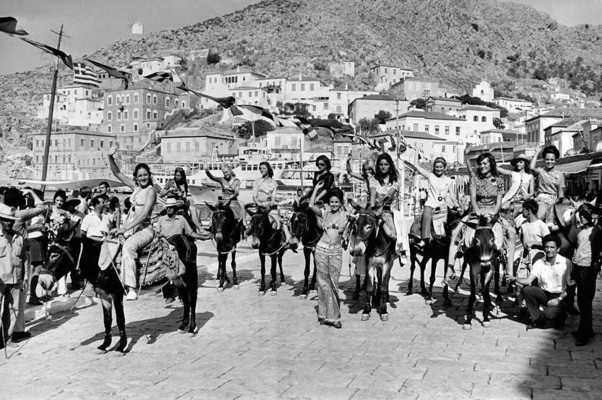
Tourism
Lindos-Acropolis in Rhodes island
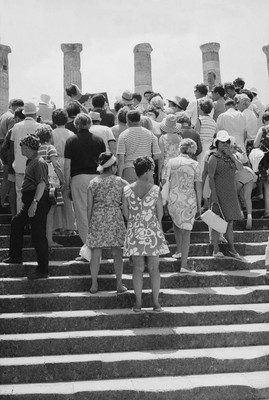
and at Acropolis-athens
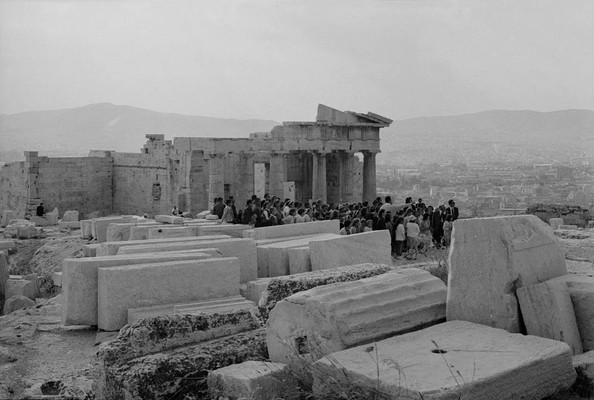
SPORTS
- Greece competed at the 1972 Summer Olympics in Munich, West Germany. 60 competitors, 58 men and 2 women, took part in 46 events in 9 sports. Greek athletes have competed in every Summer Olympic Games.
- Football is by far the most popular game. The 1972–73 Greek Football Cup was the 31st edition of the Greek Football Cup. The competition culminated with the Greek Cup Final, held at Karaiskakis Stadium, on 17 June 1973. The match was contested by Olympiacos and PAOK, with Olympiacos winning by 1–0
(sources of photos:
Europeana,
wikipedia
and https://www.bygonely.com/1970s-greece/)